I've been strangely apposed in writing about Berlin, probably because the tsunami of feeling I washed away in (and I am still swimming in). It is easy for me to step back and be objective about other locations but when the houses I grew up in, the school I graduated from, the places I worked at are still standing, after all these years, and I'm standing in front of them, awed at how time seems to be playing on 2 levels – the past and the present...
Berlin blew me away.
From the moment of arrival after an 8-hour train ride and checking into my hotel just before 9PM, I was beset by a twilight sense of wonder. Not the least of it was caused by... how long has it been since you've seen a hotel room with an actual key, hanging on a big brass fob?
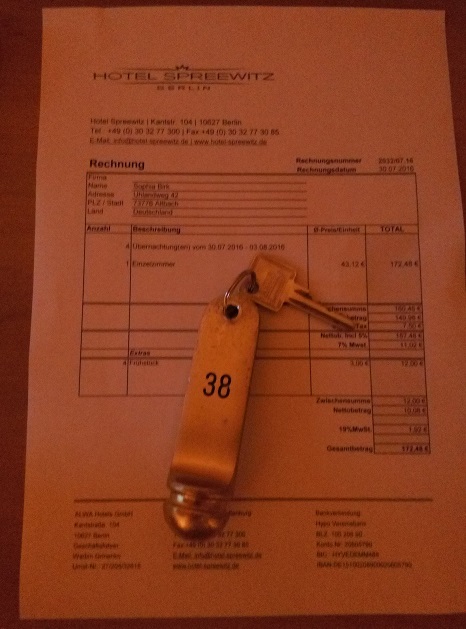
My hotel was one street over from Kurfurstendamm, affectionately referred to as the Ku'damm, the city's premier walking and shopping street. I used to "run the Ku'damm" when I was a teenager. Tired and overwhelmed, still I couldn't resist: I took off walking. I had to lay eyes on Remembrance Church, bombed out during World War II and left as a visual reminder of hatred and fear, and one man's desire to rule the world.
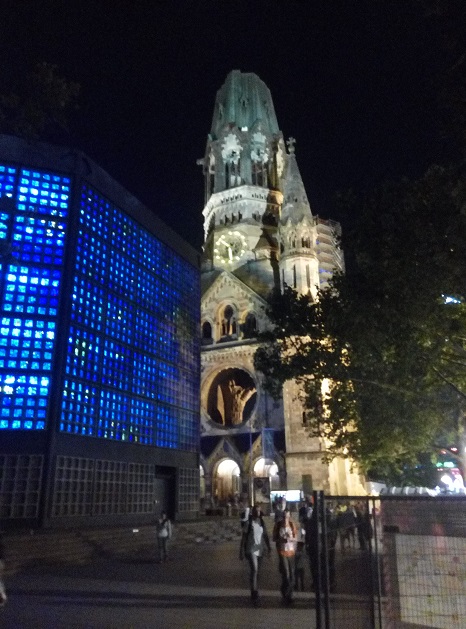
My friend Sam said it best: Germany remembers her history. I agree with him. Everywhere amidst the modern, you see the old, even in the most modern of German metropoli: Berlin.
Here, I am torn: should I include pictures you could easily find by a simple internet search, or pictures of my life growing up?
If you like doing internet searches, here are some things to look for in Berlin: Alexanderplatz, Reichstag, Brandenburg gate, Charlottenburg Palace, Gedachnisskirche, Tempelhof, Berliner Dom, Funkturm, Checkpoint Charlie.
My first full day there, after a fitful night's sleep in spite of the long train ride and all of the walking, I rented a bike and visited all of those places, dawdling at Alexanderplatz. When I called Berlin home, that location was walled off but made famous by the atomic clock and the television tower.
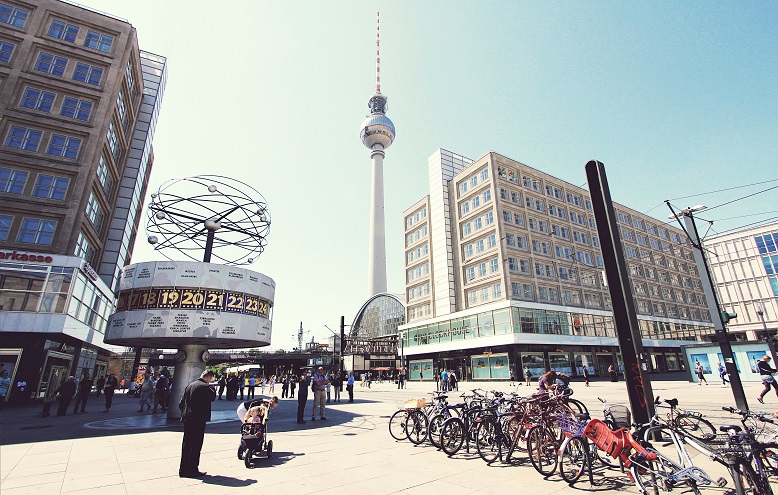
Legend has it that that tower was built when TV came into vogue, and it was to be a showpiece of East Berlin's progressiveness. The ball housed an exclusive restaurant that people vied to eat at. The only problem was that the tower was close to The Wall, so patrons could dine while longing for freedom in the west. In fact, as the story goes, everyone sat on the west side of the restaurant, hoping their weight would be enough to topple the tower into the west, thus forcing a path to freedom. In response, the restaurant was renovated to include a rotating floor, so that nobody could be exposed to only a western view.
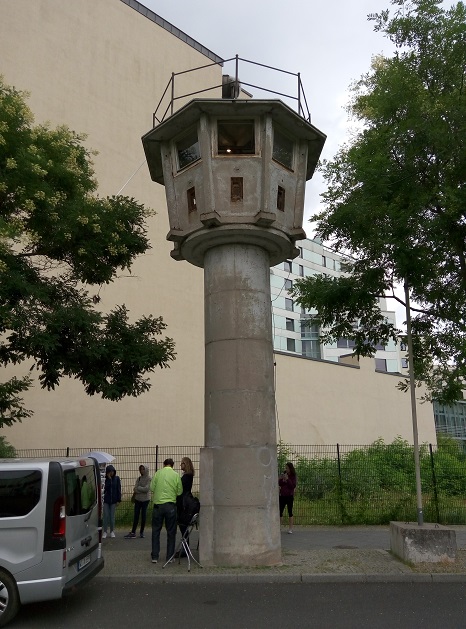
The next day I paid a day fare and rode buses to everything I remembered of my youth. Nothing had changed. From the bus window I saw the Outpost movie theater, where I had my first job. These days it is a museum for Allied artifacts. (You can find its picture on the 'Net, too)
Getting off at Oskar-Helene Heim, I walked through the former Berlin Brigade housing area to the apartment I lived in when my daughter was born.
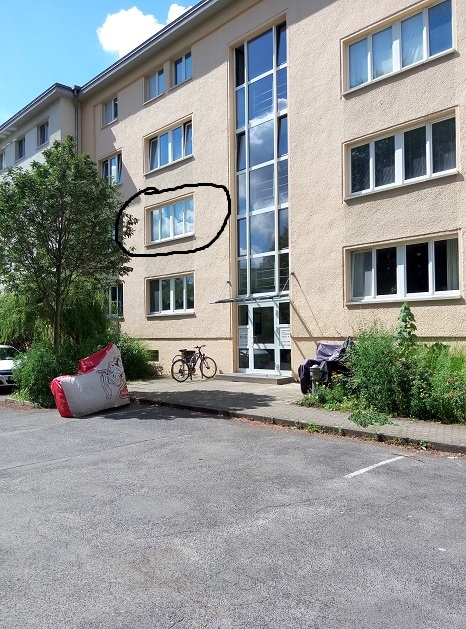
From there it was off to Goertzallee, where I worked as a Supply and Services clerk. On the way I passed McNair Barracks, formerly home to the 6th Infantry brigade where my husband was assigned to, now condominiums.
And then it was off to my old high school, and the ice cream store where we would get ice cream after class.
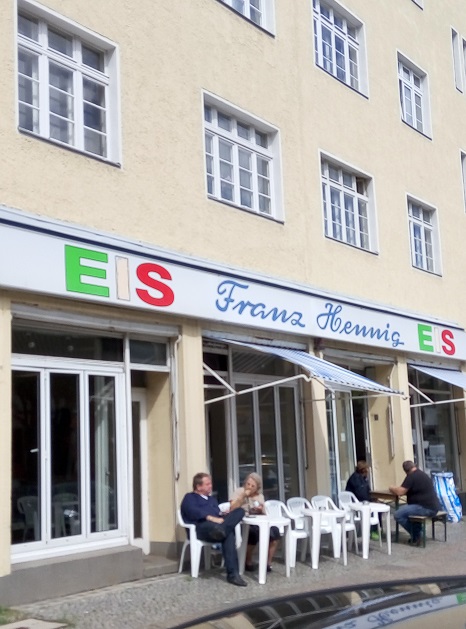
I finally found my way to Steglitz, another place younger me had hung out and shopped.
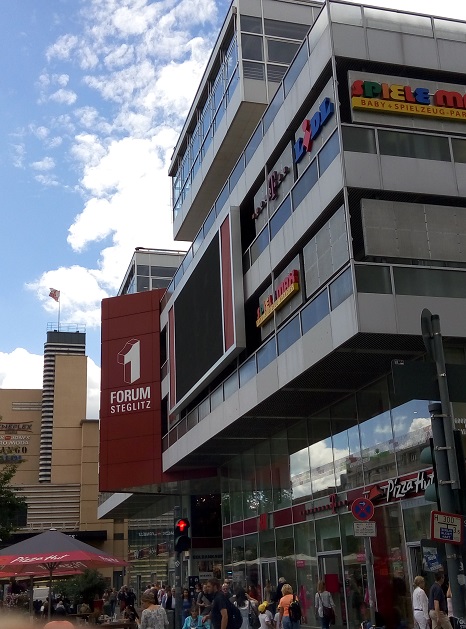
The day was waning and I was tired from all this rediscovering and, quite frankly, the emotional toll this Remembrance Tour was taking on me. Still, I had to make my way to Tempelhof, the site of the famous Air Bridge.
Immediately after World War II, while the Allied Forces were still negotiating territory, the Soviets had completely encircled West Berlin with the intent of driving the allies out, thus claiming that strategic city for themselves. No food, water, electricity or supplies could get past those barriers. People in post-war Berlin were starving and freezing to death in their bombed out homes. The Allied command – British, French and American, quickly devised a plan.
They would fly supplies into the besieged city! I can't imagine the planning and logistics that went into this effort but, every 45 seconds, a plane touched down at Tempelhof, loaded with food, medicine, and other vital materials. This went on for nearly a year: from June 1948 to May 1949. This statue commemorates the 3 Allied Powers's efforts.
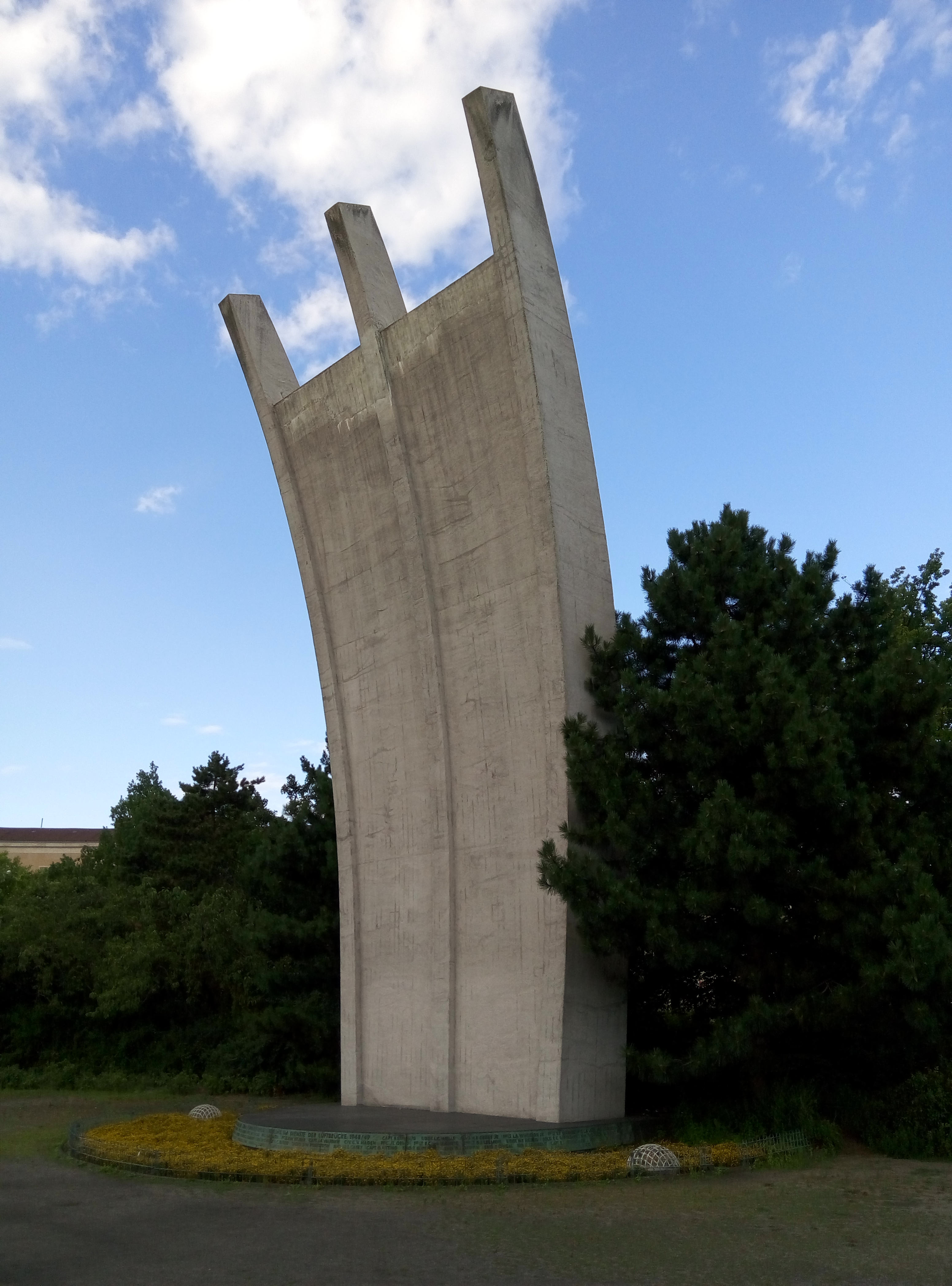
Of course, there's more to that story than this short blurb. If you're interested, here's a great link: https://history.state.gov/milestones/1945-1952/berlin-airlift
Mother's Day: I reserved the last day for my mother: where she lived, where she worked and where she rests.
I was physically and emotionally exhausted. I couldn't bear any more memories but I owed, and was owed this tribute.
16 Kaunstrasse, where she lived, is now a doctor's building. I had held a dim hope that her landlady might still be alive; I could thank her for attending to my mom. I am cravenly grateful she was not to be found.
BB shopping center, where she worked, is still there, but it no longer caters strictly to Americans. In fact, there might not be any Americans there.
Friedhof Dahlem is where, supposedly, my mother is buried. I could not find her grave but I walked through anyway. German graveyards look more like parks than graveyards. It was a peaceful letting of stormy emotions.
Back
to the pulsing life of the Ku'damm. It is time to shop for my loved
ones, in China and America. And time to let go of the past.
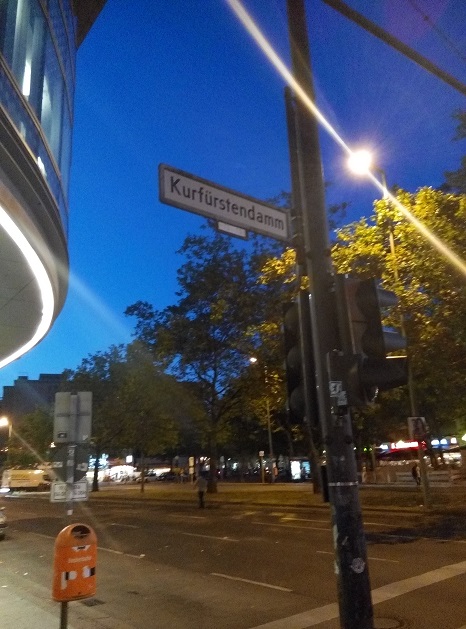
I had some great times in Berlin but, no, I didn’t go to The Sound or maybe I did. I can’t remember all the clubs and bars I went to. I met an interesting guy, Pieter, at the Flohmarkt in Charlottenberg who took me to many clubs. He was a short, stocky weightlifter with a reputation that allowed us to go into any club free. I had just recently shaved my head. I couldn’t stand the thought of watching my hair slowly disappear as it had with my father and chose to take it all off. This was in 1978 and shaved heads then weren’t as socially acceptable as they are now. (All you baldies may thank me, Yul and Telly for making it easy for you. I prefer Irish whiskey, thank you.) Pieter had an identical twin, George, who was also a weightlifter though they were seldom seen together. George had been in prison for a short time, sentenced for joyriding. Pieter had gone to visit his brother in jail and, whilst there, had exchanged clothing so that George could go out and enjoy a few days of freedom. They did this every few days and kept it up for almost the entire duration of George’s sentence until someone informed the authorities. After George completed his sentence, both brothers had to spend alternate nights in jail for some months. They enjoyed showing me the newspaper cuttings and telling me how the judge had laughed when their case came to court. With such a hard earned reputation and weightlifters’ bodies and me with my shaved head, I could easily understand why doorkeepers were reluctant to ask us for entrance money. I always seem to meet interesting and unusual characters!
I do remember, though, that we went to Jahrmarkt a few times for the best Zwiebelsuppe in Germany. It was there that Pieter had explained that, when President Kennedy had visited Berlin some years before, he had stood in front of an adoring crown and said ‘Ich bin ein Berliner’ meaning he was a doughnut and thousands of Germans laughed and agreed. He should have said ‘Ich bin Berliner’. As you know, ein Berliner is a local doughnut.
I visited Berlin again in 1987 to celebrate someone’s birthday. As we stood in an observation tower at the Brandenberger Tur and looking at the wall, I was embarrassed by the amount of graffiti written and sprayed along it. However, looking over the wall and seeing the spotlessly clean yet spartan area behind it plus the two armed guards who, I knew, were under strict orders to shoot to kill should one of them make a break for it, I decided that I preferred to live where people could spray graffiti than in such a tightly controlled and regulated society as East Germany was then.
First thought: we were in Berlin at the same time!
Second: I speculate you must have been in Kreuzberg, an area that had been more or less deserted until the influx of Turkish immigrants, who settled there. It's all been redone, now. You wouldn't recognize it (but i bet you'd recognize the Ku'damm).
Did you go to The Sound? Word has it that David Bowie hung out there; his music sure was popular at that time, in that club.
What a great story! Thanks so much for sharing.
1978, I hitched across Germany for my second visit to Berlin. After an arschlochen dropped me at the intersection of three autobahns, I resigned myself to a long schlepp in the dark. An hour or so later, I was picked up by some young people in a Ford Transit who were bringing some furniture to their friends in Berlin and they insisted I should also stay with them. I was surprised by the warm welcome from the group of anarchists who had taken over a block of flats from which the residents had been removed as it was too close to the wall for safety. We sat chatting, smoking and drinking beer for a while then I was asked which record I wanted to hear. I knew this was a crucial decision as my choice would tell the anarchists whether or not I was a kindred soul and welcome to stay there. I watched as one guy shuffled through their stock of albums until I saw one that I knew should be the one. 'The Doors', I said and everyone relaxed. I was one of them and was welcomed as a brother. There followed a few weeks of fun in the bars and clubs off the Ku'damm until it was time for me to leave. I woke early on my final morning and went out quietly to buy what was needed for breakfast. Oh, the taste of fresh Zwiebelbrot and coffee. The others woke up at the smell of fresh coffee and we sat down to eat together until one guy remembered they had run out of Zwiebelbrot. Another remembered they had needed more jam and honey and all eyes fell on me. I was told that it wasn't necessary for me to do what I had done. I countered the mild reprimand by saying that it was always necessary to say 'Thank you.'
Later I made my way to the recognised hitching site for leaving Berlin but the heel on my right boot broke off completely. Looking around, I spotted a nearby cobbler's shop which was open so I went there and explained my problem. The guy stared at me then said that I was the luckiest person in Germany as all German cobblers closed their shop on Monday and he had only popped in to repair some shoes for his wife.
He was right about my luck then for, within twenty minutes, I got a lift straight to the city I had planned to visit next, Osnabruck.
I love Berlin and want to go back.







Comment